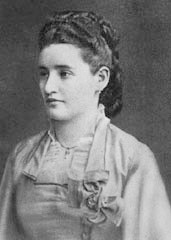
Love did not come to me -
So I vegetate like a plant,
In a cellar, without light.
Love did not come to me -
So I resound like a violin,
Whose bow has been broken.
Love did not come to me -
So I immerse myself in work,
Living myself sore from duty.
Love did not come to me -
So I gladly think of death,
As a friendly face.
Bertha Pappenheim is the real name of Josef Breuer's patient, "Anna O.," who Breuer and Freud wrote about in Studies on Hysteria (1895).
If Bertha Papenheim wrote that lovely poem in 1910 she would have bee 51. It is a lovely description of the price she paid for dedicating herself to working for others. An anti-zionist Jew, she made a significant contribution to the welfare of women, founding the Jewish Women's League in 1904 and leading it for 20 years, and deserves to be remembered for that.
ReplyDeleteUnfortunately she is remembered principally for her role as 'Anna O', Breuer's patient, when she was 22. She was almost certainly misdiagnosed. According to historian Henri Ellenberger she turned up in a clinic at Kreuzlingen on Lake Konstanz a year later - 1882 - with the same symptoms that Breuer noted - trances, hallucinations, convulsions, severe facial neuralgia, recurring loss of ability to speak German and also, not mentioned in Breuer's or Freud's accounts, a severe addiction to morphine, prescribed by Breuer.
Psychoanalysts still use her as a case example for 'hysteria', or more commonly these days, dissociation. The evidence, examined by many specialists since then strongly suggests a neurological disorder, probably encephalitis. Breuer and Freud claimed that the 'talking cure' was effective in her case. Actually it was probably the morphine, which makes most things better.
None of her published works mention Breuer.